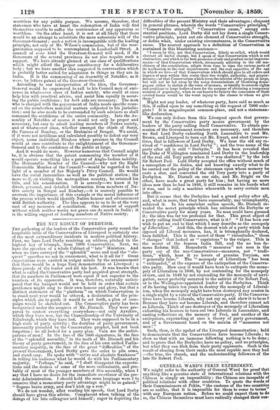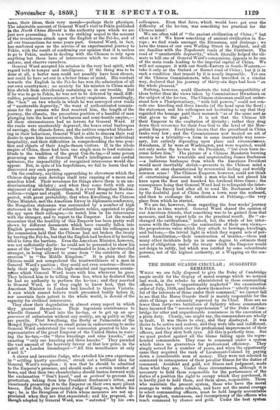GENERAL WARD'S PEKIN EXPERIMENT.
WE might refer to the authority of General Ward for proof that anything like a genuine state of international relations with the Chinese is simply an impossibility; the Chinese are incapable of political relations with other countries. To quote the words of their Commissioners at Pekin, " the customs of the two countries are so unlike, that it is impossible for them to come to terms" with any European nation. Before we could expect them to do so, the Chinese themselves must have radically changed their cue-
toms, their ideas, their very morale—perhaps their physique. The admirable account of General Ward's visit to Pekin published in the North China Herald is the authority upon which we are just now proceeding. It is a very striking sequel to the account of the treacherous atack upon the English at the Pei-ho, and of all our transactions for some years past. General Ward, in fact, has conferred upon us the service of an experimental journey to Pekin, with the result of confirming our opinion that it is useless to go lo Pekin, useless in dealing with the Chinese to rely upon anything but those laws of intercourse which we can dictate, enforce, and observe ourselves.
General Ward accepted his mission in the very best spirit, with regard both to temper and intelligence. If the thing was to be done at all, a better man could not possibly have been chosen, nor could he have set out in a better frame of mind. His conduct towards the English in the Pei-ho has won the admiration of all our own countrymen; no anxiety, for his mission in China made him shrink from chivalrously sustaining us in our trouble. But if he was to go to Pekin, he was not to be deterred by small diffi- culties, personal inconveniences, or hasty suspicions. Accordingly, the "box" on two wheels in which he was conveyed over roads of. " unutterable depravity," the want of authenticated commis- sions for the persons who first received him, the length of the journey, the climate, the precarious position of a handful of men plunging into the heart of a barbarous and semi-hostile empire,— all these circumstances had no terrors for General Ward. If the roads were unutterably depraved, the boxes cruel burlesques of carriage, the climate fierce, and the natives somewhat blunder- ingin their behaviour, General Ward is able to discern their real desire to spare him inconvenience, their courtesy, their individual hospitality, and their difficulties in comprehending the true posi- tion and objects of their Anglo-Saxon visitors. If in the whole empire of China, there had been one single man to lend verisimi- litude to the tradition of the great Con-fu-tae,—if some person possessing one tithe of General Ward's intelligence and cordial optimism' the impossibility of recognized intercourse would dis- appear. But, in spite of his hopefulness, we fail to learn that he discovered any such person.
- On the contrary, anything approaching to cleverness which the Chinese display soon develops itself into cunning of a mean and senseless kind. Their reverence for things above them is an un- discriminating idolatry ; and when they come forth with any statement of astute Machiavellism, it is a very Mongolian Machia- vellism—vulgar and stupid. General Ward seems to have sus- pected, with great probability, that when Kweiliang, the Chinese Prime Minister, met the American Envoy in diplomatic conference, the Mongolian statesman was surrounded by a number of high statesmen in the disguise of subordinate nobles, appointed to play the spy upon their colleague,—to watch him in his intercourse with the stranger, and to report to the Emperor. Let the reader remember that the hostility of this Emperor has been pretty well shown by different documents which have casually fallen into English possession. The same Kweiliang and his colleagues in the commission held that the Chinese had not broken the treaty by barring the Pei-ho, but that the English had broken it by having tried to force the barriers. Even the American Minister, however, was not sufficiently docile : he could not be persuaded to show his sense of the " heavenly favour" vouchsafed to him, afar-travelled stranger, in being allowed to come from " the outskirts of the creation " to " the Middle Kingdom." It is plain that the Chinese could not comprehend the trustworthiness of a man in
General Ward's position; oould not even construe—Heaven help their ugly faces !—the high-minded and ingenuous counte- mince which General Ward bears with him wherever he goes. They believed him to be telling them lies, when he declared that he had no authority to perform the ko-tau ; and they asserted to General Ward, as if they ought to know best, that the American Minister in London had kneeled to Queen Victoria. A race which cannot believe truth presented bodily before it, nor ascertain facts patent to the whole world, is devoid of the capacity for civilized intercourse. They show their degradation in almost every aspect in which they present themselves. Their ingenious contrivances to wheedle General Ward into the ko-tau, or to get up an ap- pearance of submission without any reality, are ei paltry as they are puerile. First Kweiliang, the Derby or Palmerston of the Mongol Empire, bestowed no small pains in endeavouring to make General Ward understand the vast concession granted to him as representative of the great Emperor of the United States in waiv- ing the ko-tan,—the " three kneelings and nine knocks," and exacting " only one kneeling and three knocks." They paraded the vast amount of the heavenly favour at that low price, in the spirit of a London linendraper—" All this munificence at only 1 and 3."
A clever and inventive Judge, who extolled his own expertness in " settling knotty questions," struck out a brilliant idea for `General Ward's reception : it was that he should be admitted to the Emperor's presence, and should make a certain number of bows, and that then two chamberlains should hasten forward with the exclamation " Don't kneel," and so pretend to prevent his prostration, taking from him President Buchanan's letter, and vicariously presenting it to the Emperor on their own more pliant knees. But Sieh, the provincial Judge of Kiang-su, is before his age ; he is the Brougham of Pekin whose measures are not ap- preciated when they are first enunciated ; and his, proposal, al- though adopted by General Ward, was " outvoted' by his own
colleagues. Even that farce, which would have got over the difficulty of the ko-tau, was something too practical for the Chinese mind We are often told of " the ancient civilization of China ; " but what is it ? We know something of ancient civilization in Eu- rope; we find roads amongst the Etruscans, and drainage ; we have the traces of our own Watling Street in England, and all are familiar with the Napoleonic roads of the Continent. The road of " unutterable depravity," which literally helped the cli- mate to kill one of General Ward's companions, appears to be one of the main roads leading to the imperial capital of China. We will not compare it with our South-Eastern or South-Western,- take it only as the Oxford or Barnet road of China ; but it is in such a condition that transit by it is nearly impossible. Yet one of the Chinese Commissioners, who had travelled in a similar way, declared that his journey of thirty-six days had been " on the whole pleasant." Nothing, however, could illustrate the total incompatibility of ideas better than the views taken by Commissioner Hwashana on the subject of the ko-tau. The Chinese statesman could not under- stand how a Plenipotentiary, " with full powers," could not con- cede one kneeling and three knocks (of the head upon the floor) ; the statesman and his colleagues not hesitating to say that they regarded the homage paid their monarch " as of the same sort as that given to the gods." It is not that the Chinese lift their Emperor to the exaltation of divinity ; rather they drag down their reverence for their Joss God to the level of the Mon- golian Emperor. Everybody knows that the priesthood in China ranks very low ; and the Commissioners now treated an act of worship as a triviality—a form in some inscrutable way neces- sary, but entirely depending upon place and circumstances. Hwashana, if he were at Washington, and were required, would not only make the ko-tau to the President, " but even burn in- cense before him." The picture of a Chinese Mandarin burning incense before the venerable and unpretending James Buchanan —a ludicrous burlesque from which the American President would most inevitably shrink—presents to the Chinese mind a picture at once characterized by reverential feeling and worldly common sense ! The Chinese Emperor. however, could not think of entertaining discussion with a man who had not placed his knee upon the floor and knocked his forehead three times ; the consequence being that General Ward had to relinquish the inter- view. The Envoy had after all to send Mr. Buchanan's letter by the doubtful post of China from a town near the seaboard, and then to exchange the ratifications at Pehtang,—the very place from which he started. We are far, however, from regarding the four weeks' journey to Pekin as time wasted. General Ward shared the opinion of our American friends, that something was to be gained from that measure, and his report tells us the practical result. He " ex- changed the ratifications," indeed, but the whole of his inter- course with the Chinese,—the contraction of their own views — the preposterous value which they attach to bowings, kneelings, and buttons,—the trivial light in which they regard acts of per- sonal humiliation,—their construction of treaties,—these and many other incidents help us in some degree to estimate their sense of obligation under the treaty which the Emperor would not deign to ratify, but which was ratified by some subordinate persons, not of the highest authority, at a Wapping on the sea- coast.



























 Previous page
Previous page